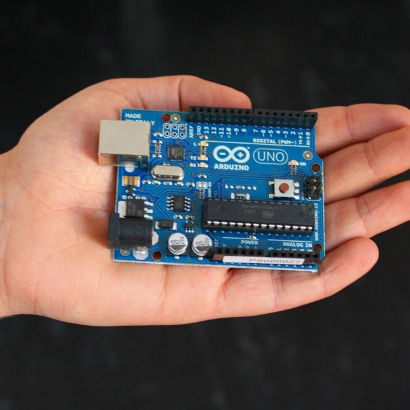Linux is the brand for Open Source Software. There are many who have built on this brand to build their own open source brand.
Arduino is a an open source hardware solution for small eletronics prototyping.
Arduino is an open-source electronics prototyping platform based on flexible, easy-to-use hardware and software. It's intended for artists, designers, hobbyists, and anyone interested in creating interactive objects or environments.
Arduino can sense the environment by receiving input from a variety of sensors and can affect its surroundings by controlling lights, motors, and other actuators. The microcontroller on the board is programmed using the Arduino programming language (based on Wiring) and the Arduino development environment (based on Processing). Arduino projects can be stand-alone or they can communicate with software running on a computer (e.g. Flash, Processing, MaxMSP).
Photo by the Arduino Team
A business model describes the rationale of how an organization creates, delivers, and captures value
GigaOm's Stacey Higganbotham attended the Open Compute Summit and she discusses the business model of Open Source Hardware.
More infrastructure, more users, less money.
What’s occurring here is a shift in the value of a server, and thus of server makers. What used to be high-end machines with features driven by the engineers inside Dell, IBM, HP, etc., have now become a commodity, and not a Dell-like commodity either — a really low-end commodity. These servers are stripped-down machines custom-built by the guys who built Dell’s and HP’s boxes. The rise of manufacturers like Quanta has begun.
This rise was a direct result of the industry refusing to listen to the demands of its customers, especially because those demands didn’t seem to involve a way for the server guys to make much money. At first, Rackable, now called SGI, picked up on the business, but as Forrest Norrad, the VP of servers at Dell pointed out on Wednesday at the Open Compute Summit, Dell realized that companies like Facebook were not just one-off complainers. They were the leading edge of a new way of doing business– and IT was a fundamental element of that business.
...
Throw the server vendors a bone and let’s keep moving.
And here’s where the Open Compute Project comes in. Unlike DCS, which was a successful effort to serve the market once Dell had validated it, the Open Compute Project is a coup by the buyers of servers to take control of their hardware destiny. As such, I wondered if this coup would leave room for Dell or HP to continue to build their businesses. After attending Wednesday’s Open Compute Summit, I can say it seems like it will.
Open Compute is still in the early stages, and it has the potential to be a brand in itself.
